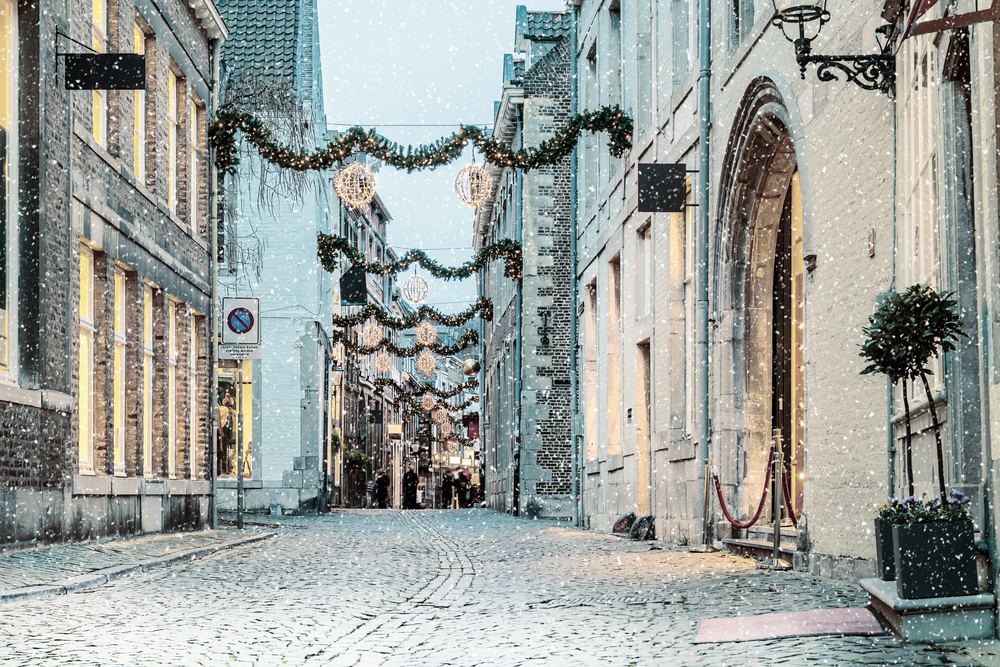In the Netherlands, Christmas Day is an epic celebration that spans two whole days. Plus, over the period of November to December, you can expect to celebrate multiple festive events.
From the arrival of Sinterklaas to Saint Nicholas Eve, ice-skating galore and finally, Christmas Day (or days!), the Dutch really love to celebrate Christmas.
What is it?
The Dutch quirk leaves us internationals with a seasonal feeling. In the Netherlands, it’s clear they really appreciate the colder winter months and fill them up with feasts, parades, and more!
But, the quirky thing about Christmas in the Netherlands is just how long the celebrations last.
In the Netherlands, the Dutch celebrate Christmas Day. And, here in the land of windmills and tulips, December 25 and December 26 are both public holidays and are seen as Christmas Day One and Two.
Over the course of these two days, there will be gift-giving, feasting, and lots of celebration in the advent of Jesus Christ’s birth. The Netherlands, is, after all, founded in Christianity, and, in particular, Calvinism. 🙏
But, Christmas Day in the Netherlands has a major focus on spending time with friends and family and reconnecting before the kick-off of the New Year.
So, enjoy all the peace and quiet in December because once January 1 hits, you’ll have the sound of fireworks stuck in your ears. 🎇
Christmas day, not to be confused with the arrival of Sinterklaas
To internationals, it can seem that Christmas celebrations start on the first Saturday after November 11. On this Saturday, Dutch Santa, known as Sinterklaas, arrives in the Netherlands! 🎅
However, despite the festive feeling, this tradition is completely separate from Dutch Christmas Day.
In fact, the Dutchies have an entirely different day dedicated to celebrating the saint — Saint Nicholas Eve!
Traditionally, Sinterklaas travels all the way from Spain on his boat, with his helpers in tow, the Zwarte Piet (yes, those controversial guys).
He visits all the Dutch cities and towns, usually bringing his lovely steamboat along, and then says hello to all the awaiting Dutch children.
His arrival consists of a huge parade, ending in the town’s market square — and, if you’re lucky, you might even be able to say hello to the elusive fellow!
Saint Nicholas Eve
This tradition stems from the Dutchies’ long connection with Christianity.
Saint Nicholas, the patron saint of this holiday, was known to be a generous and giving Saint, and this is perhaps why we exchange gifts in the saint’s name. 🎁
Sinterklaas is the Dutch word for Saint Nicholas, and it is this Dutch translation of the saint’s name that led to the English tradition of ‘Santa Clause.’
Sinterklaas, Santa Claus; sound pretty similar, don’t they?
The Eve of Saint Nicholas kicks off on December 5 in the Netherlands, and consists of gift-giving, a little bit of playful poetry, and a truly Dutch novelty; gourmetten.

But both Sinterklaas and the feast of Saint Nicholas are separate events from December 25 and 26.
Why do they do it?
This Dutch quirk is explained by the Netherlands’ history of religion and Christianity.
It starts with the celebration of Sint Maarten on November 11, to Sinterklaas’s arrival, to the feast of Saint Nicholas, and finally, the celebration of the birth of Jesus. ✝
Each of these days has its own separate traditions. Though in the 21st century, many of these traditions have become more Westernised, with ideas of gift-giving, decorating, and more, they remain special to the Dutch and Dutch history.
Yet, the reason why they celebrate Christmas over two days is quite simple; this way, families have enough time to reconnect with one another, enjoy meals and cosy up by the fire.
December 26, also known as Saint Stephen’s Day, or Boxing Day if you’re from the UK, is a continuation of the festivities, and means there’s more time for family.
Why is it quirky?
For many internationals, the most important date in the winter calendar is December 25.
All the festivities during the colder months lead up to this one day, and the actual day can be hectic and exhausting, despite the atmosphere of giving in the air.
And, the day after? Saint Stephen’s day usually consists of Christmas tidy-up, eating leftovers, and trying to recover from hectic, pre-Christmas work schedules.
Many of us, I’d say, would appreciate an extra Christmas — if not just to have an extra lie-in. 😴
Should you join in?
Yes! If you’re lucky enough to be close to any Dutch families, indulge in the traditions of gourmetten, pepernoten, and letter-giving.
If you’ve got a large family, the extra day means you have time for those closest to you and extended relatives, without making anyone feel left out.
Plus, you’ll find that spreading out the celebrations can make Christmas Day itself all the more enjoyable; say goodbye to last-minute turkey shopping, and stressful gift-wrapping!
What do you think of this Dutch quirk? Have you experienced it? Tell us in the comments below!

The Dutch, in general, do not need to worry about ‘last minute turkey shopping’: IF they eat Turkey at all on Christmas day (most of them do not!), they will have ordered that long before at a ‘poelier’ (poultry specialist that also delivers game and other less commonly eaten animals).
To married couples, spreading Christmas over 2 days is the perfect solution to ‘visiting the parents’: visit one partner’s parents on the 25th and the other one’s on the 26th. Do not forget to reverse next year!
Since surprise presents are traditionally given at Sinterklaas, do not worry about the gift wrapping for Christmas either. IF you exchange gifts for Christmas, have the shop wrap them for you.